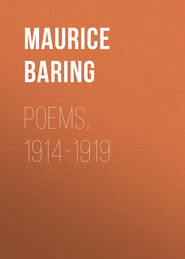По всем вопросам обращайтесь на: info@litportal.ru
(©) 2003-2024.
✖
Overlooked
Настройки чтения
Размер шрифта
Высота строк
Поля
"You are like the people who think one can only have measles once," she said. "One can have it over and over again, and the worse you have it once, the worse you may get it again. He is just in the most susceptible state of all."
I said they both seemed to me in the same position. They were both of them bound by old ties.
"That is just what will make it easier."
I asked whether there would be any other obstacles to a marriage between them, such as money. Princess Kouragine said that Kranitski ought to be quite well off.
"There was no obstacle of that kind," she said. "He is a Catholic, but I do not suppose that will make any difference."
"Not to Miss Brandon," I said, "nor really to her aunt: Mrs. Lennox might, I think, look upon it as a kind of obstacle; but a little more an obstacle than if he was a radical and a little less of one than if he was socialist."
She said she did not think that Mrs. Lennox would like her niece to marry anyone.
"But if they want to get married nothing will stop them. That girl has a character of iron."
"And he?" I asked.
"He has got some character."
"Would the other person mind – the lady at Rome?"
"She probably will mind, but she would not prevent it. Elle est foncièrement bonne. Besides which she knows that it is over, there is nothing more to be said or done. She is philosophe too. A sensible woman. She insisted on marrying her husband. She was in love with him directly she came out, and they were married at once. He would have been an excellent husband for almost anyone else except for her, and if she had only waited two years she would have known this herself. As it was, she married him, and found she had married someone else. The inevitable happened. She is far too sensible to complain now. She knows she has made a gâchis of her life, and that she only has herself to thank. As it is, she has her children and she is devoted to them. She will not want to make a gâchis of Kranitski's life as well as of her own, and she nearly did that too. If he marries and is happy she ought to be pleased, and she will be."
"And what about the young man who was engaged to Miss Brandon?" I asked.
"I do not give that story a thought," said the Princess. "They were probably in the same situation towards each other as the Russian couple I told you of were before they were married, only Jean had the good fortune to do nothing in a hurry. She is probably now profoundly grateful. How can a girl of eighteen know life? How can she even know her own mind?"
"It depends on the young man," I said. "We know nothing about him."
"Yes, we know nothing about him; but that probably shows there is nothing to know. If there were something to know we should know it by now. It was all so long ago. They are both different people now, and they probably know it."
I said I would not like to speculate or even hazard a guess on such a matter. It might be as she said, but the contrary might just as well be true. I did not think Miss Brandon was a person who would change her mind in a hurry. I thought she was one of the rare people who did know her own mind. I could imagine her waiting for years if it was necessary.
As I was saying this, Princess Kouragine said to me:
"She is walking across the park now with Kranitski. They have sat down on a seat near the music kiosk. They are talking hard. The lamp is being lit – she looks ten years younger than she did last week, and she has got on a new hat."
CHAPTER V
During the rest of that day I saw nobody. I gathered there were races somewhere, and Mrs. Lennox had taken a large party. Just before dinner I got a message from Rudd asking whether he might dine at my table.
I do not dine in the big dining-room, as I find the noise and the bustle trying, but in a smaller room where some of the visitors have their petit déjeuner.
So we were alone and had the room to ourselves. I asked him if he had been working.
He said he had been making notes, plans and sketches, but he could not get on unless he could discuss his work with someone.
"The story is gradually taking shape," he said. "I haven't made up my mind what the setting is to be. But I have got the kernel. My story is what I told you it would be. The Sleeping Beauty in the Wood, but when the Prince wakes her up she is no longer the same person as she was when she went to sleep. The enchantment has numbed her. She will have none of the Fairy Prince; she doesn't recognize him as a Fairy Prince, and she lets him go away. As soon as he is gone she regrets what she has done and begins to hope he will come back some day. Time passes and he does come back, but he has forgotten her and he does not recognize her. Someone else falls in love with her, and she thinks she loves him; but, at the first kiss he gives her, the forest closes round her and she falls asleep again."
I asked him if it was going to be a fairy-tale.
He said, No, a modern story with perhaps a mysterious lining to it.
He imagined this kind of story. A girl brought up in romantic surroundings. She meets a boy who falls in love with her. This, in a way, wakens her to life, but she will not marry him; and he goes away for years. Time passes. She leads a numbed existence. She travels, and somewhere abroad she meets the love of her youth again. He has forgotten her and loves someone else. Someone else wants to marry her. They are engaged to be married. But as soon as things get as far as this the man finds that in some inexplicable way she is different, and he breaks off the engagement, and she goes on living as she did before, apparently the same, but in reality dead.
"Then," I said, "she always loves the Fairy Prince of her youth."
He said: "She thinks she loves him when it is too late, but in reality she never loves anyone. She is only half-awake in life. She never gets over the enchantment which numbs her for life."
I asked what would correspond to the enchantment in real life.
He said perhaps the romantic surroundings of her childhood.
I said I thought he had not meant her to be a romantic character.
"No more she is," he explained. "The romance is all from outside. She looks romantic, but she isn't. She is like a person who has been bewitched. She always thinks she is going to behave like an ordinary person, but she can't. She has no dreams. She would like to marry, to have a home, to be comfortable and free, but something prevents it. When the young man proposes to her she feels she can never marry him. As soon as he is gone, she regrets having done this, and imagines that if he came back she would love him."
"And when he does come back, does she love him?" I asked.
"She thinks she does, but that is only because he has forgotten her. If he hadn't forgotten her, and had asked her to marry him, she would have said 'No' a second time. Then when the other person who is in love with her wants to marry her, she thinks she is in love with him; she thinks he is the Fairy Prince; but as soon as they are engaged, he feels that his love has gone. It has faded from the want of something in her which he discovers at the very first kiss; he breaks off the engagement, and she is grateful at being set free, and glad to go back to her forest."
I asked if she is unhappy when it is over.
He said, "Yes, she is unhappy, but she accepts it. She is not broken-hearted because she never loved him. She realizes that she can't love and will never love, and accepts the situation."
I said that I saw no mysterious lining in the story as told that way.
He said there was none; but the lining would come in the manner the story was told. He would try and give the reader the impression that she had come into touch with the fairy world by accident and that the adventure had left a mark that nothing could alter.
She had no business to have adventures in fairy land.
She had strayed into that world by mistake. She was not native to it, although she looked as if she were.
I said I thought there ought to be some explanation of how and why she got into touch with the fairy world.
He said it was perhaps to be found in the surroundings of her childhood. She perhaps inherited some strange spiritual, magic legacy. But whatever it was it must come from the outside. Perhaps there was a haunted wood near her home, and she was forbidden to go into it. Perhaps the legend of the place said that anyone of her family who visited that wood before they were fifteen years old, went to sleep for a hundred years. Perhaps she visited the wood and fell asleep and had a dream. That dream was the hundred years' sleep, but she forgot the dream as soon as she was awake.
I asked him if he thought this story fitted on to Miss Brandon's character or to the circumstances of her life.
He said he knew little about the circumstances of her life. Mrs. Lennox had told him that her niece had once nearly married someone, but that it had been an impossible marriage for many reasons, and that she did not think her niece regretted it. That several people had wanted to marry her abroad, but that she had never fallen in love.
"As to her character, I am confirmed," he said, "in what I thought about her the first time I saw her. All her looks are poetry and all her thoughts are prose. She is practical and prosaic and unimaginative and quite passionless. But I should not be in the least surprised if she married a fox-hunting squire with ten thousand a year. All that does not matter to me. I am not writing her story, but the story of her face. What might have been her story. And not the story of what her face looks like, but the story of what her face means. The story of her soul, which may be very different from the story of her life. It is the story of a numbed soul. A soul that has visited places which it had no business to visit and had had to pay the price in consequence.
"She reminds me of those lines of Heine:
"Sie waren langst gestorben und wussten
es selber kaum."
"That is, of course, only one way of writing the story I have planned to you. I shall not begin at the beginning at any rate. Perhaps I shall never write the story at all. You see, I do not intend to publish it in any case. People would say I was making a portrait. As if an artist ever made a portrait from one definite real person. People give him ideas. But on the other hand it is my holiday, and I do not want to have all the labour of planning a real story, and at the same time I want an occupation. This will keep me busy. I shall amuse myself by sketching the story as I see it now."
I said they both seemed to me in the same position. They were both of them bound by old ties.
"That is just what will make it easier."
I asked whether there would be any other obstacles to a marriage between them, such as money. Princess Kouragine said that Kranitski ought to be quite well off.
"There was no obstacle of that kind," she said. "He is a Catholic, but I do not suppose that will make any difference."
"Not to Miss Brandon," I said, "nor really to her aunt: Mrs. Lennox might, I think, look upon it as a kind of obstacle; but a little more an obstacle than if he was a radical and a little less of one than if he was socialist."
She said she did not think that Mrs. Lennox would like her niece to marry anyone.
"But if they want to get married nothing will stop them. That girl has a character of iron."
"And he?" I asked.
"He has got some character."
"Would the other person mind – the lady at Rome?"
"She probably will mind, but she would not prevent it. Elle est foncièrement bonne. Besides which she knows that it is over, there is nothing more to be said or done. She is philosophe too. A sensible woman. She insisted on marrying her husband. She was in love with him directly she came out, and they were married at once. He would have been an excellent husband for almost anyone else except for her, and if she had only waited two years she would have known this herself. As it was, she married him, and found she had married someone else. The inevitable happened. She is far too sensible to complain now. She knows she has made a gâchis of her life, and that she only has herself to thank. As it is, she has her children and she is devoted to them. She will not want to make a gâchis of Kranitski's life as well as of her own, and she nearly did that too. If he marries and is happy she ought to be pleased, and she will be."
"And what about the young man who was engaged to Miss Brandon?" I asked.
"I do not give that story a thought," said the Princess. "They were probably in the same situation towards each other as the Russian couple I told you of were before they were married, only Jean had the good fortune to do nothing in a hurry. She is probably now profoundly grateful. How can a girl of eighteen know life? How can she even know her own mind?"
"It depends on the young man," I said. "We know nothing about him."
"Yes, we know nothing about him; but that probably shows there is nothing to know. If there were something to know we should know it by now. It was all so long ago. They are both different people now, and they probably know it."
I said I would not like to speculate or even hazard a guess on such a matter. It might be as she said, but the contrary might just as well be true. I did not think Miss Brandon was a person who would change her mind in a hurry. I thought she was one of the rare people who did know her own mind. I could imagine her waiting for years if it was necessary.
As I was saying this, Princess Kouragine said to me:
"She is walking across the park now with Kranitski. They have sat down on a seat near the music kiosk. They are talking hard. The lamp is being lit – she looks ten years younger than she did last week, and she has got on a new hat."
CHAPTER V
During the rest of that day I saw nobody. I gathered there were races somewhere, and Mrs. Lennox had taken a large party. Just before dinner I got a message from Rudd asking whether he might dine at my table.
I do not dine in the big dining-room, as I find the noise and the bustle trying, but in a smaller room where some of the visitors have their petit déjeuner.
So we were alone and had the room to ourselves. I asked him if he had been working.
He said he had been making notes, plans and sketches, but he could not get on unless he could discuss his work with someone.
"The story is gradually taking shape," he said. "I haven't made up my mind what the setting is to be. But I have got the kernel. My story is what I told you it would be. The Sleeping Beauty in the Wood, but when the Prince wakes her up she is no longer the same person as she was when she went to sleep. The enchantment has numbed her. She will have none of the Fairy Prince; she doesn't recognize him as a Fairy Prince, and she lets him go away. As soon as he is gone she regrets what she has done and begins to hope he will come back some day. Time passes and he does come back, but he has forgotten her and he does not recognize her. Someone else falls in love with her, and she thinks she loves him; but, at the first kiss he gives her, the forest closes round her and she falls asleep again."
I asked him if it was going to be a fairy-tale.
He said, No, a modern story with perhaps a mysterious lining to it.
He imagined this kind of story. A girl brought up in romantic surroundings. She meets a boy who falls in love with her. This, in a way, wakens her to life, but she will not marry him; and he goes away for years. Time passes. She leads a numbed existence. She travels, and somewhere abroad she meets the love of her youth again. He has forgotten her and loves someone else. Someone else wants to marry her. They are engaged to be married. But as soon as things get as far as this the man finds that in some inexplicable way she is different, and he breaks off the engagement, and she goes on living as she did before, apparently the same, but in reality dead.
"Then," I said, "she always loves the Fairy Prince of her youth."
He said: "She thinks she loves him when it is too late, but in reality she never loves anyone. She is only half-awake in life. She never gets over the enchantment which numbs her for life."
I asked what would correspond to the enchantment in real life.
He said perhaps the romantic surroundings of her childhood.
I said I thought he had not meant her to be a romantic character.
"No more she is," he explained. "The romance is all from outside. She looks romantic, but she isn't. She is like a person who has been bewitched. She always thinks she is going to behave like an ordinary person, but she can't. She has no dreams. She would like to marry, to have a home, to be comfortable and free, but something prevents it. When the young man proposes to her she feels she can never marry him. As soon as he is gone, she regrets having done this, and imagines that if he came back she would love him."
"And when he does come back, does she love him?" I asked.
"She thinks she does, but that is only because he has forgotten her. If he hadn't forgotten her, and had asked her to marry him, she would have said 'No' a second time. Then when the other person who is in love with her wants to marry her, she thinks she is in love with him; she thinks he is the Fairy Prince; but as soon as they are engaged, he feels that his love has gone. It has faded from the want of something in her which he discovers at the very first kiss; he breaks off the engagement, and she is grateful at being set free, and glad to go back to her forest."
I asked if she is unhappy when it is over.
He said, "Yes, she is unhappy, but she accepts it. She is not broken-hearted because she never loved him. She realizes that she can't love and will never love, and accepts the situation."
I said that I saw no mysterious lining in the story as told that way.
He said there was none; but the lining would come in the manner the story was told. He would try and give the reader the impression that she had come into touch with the fairy world by accident and that the adventure had left a mark that nothing could alter.
She had no business to have adventures in fairy land.
She had strayed into that world by mistake. She was not native to it, although she looked as if she were.
I said I thought there ought to be some explanation of how and why she got into touch with the fairy world.
He said it was perhaps to be found in the surroundings of her childhood. She perhaps inherited some strange spiritual, magic legacy. But whatever it was it must come from the outside. Perhaps there was a haunted wood near her home, and she was forbidden to go into it. Perhaps the legend of the place said that anyone of her family who visited that wood before they were fifteen years old, went to sleep for a hundred years. Perhaps she visited the wood and fell asleep and had a dream. That dream was the hundred years' sleep, but she forgot the dream as soon as she was awake.
I asked him if he thought this story fitted on to Miss Brandon's character or to the circumstances of her life.
He said he knew little about the circumstances of her life. Mrs. Lennox had told him that her niece had once nearly married someone, but that it had been an impossible marriage for many reasons, and that she did not think her niece regretted it. That several people had wanted to marry her abroad, but that she had never fallen in love.
"As to her character, I am confirmed," he said, "in what I thought about her the first time I saw her. All her looks are poetry and all her thoughts are prose. She is practical and prosaic and unimaginative and quite passionless. But I should not be in the least surprised if she married a fox-hunting squire with ten thousand a year. All that does not matter to me. I am not writing her story, but the story of her face. What might have been her story. And not the story of what her face looks like, but the story of what her face means. The story of her soul, which may be very different from the story of her life. It is the story of a numbed soul. A soul that has visited places which it had no business to visit and had had to pay the price in consequence.
"She reminds me of those lines of Heine:
"Sie waren langst gestorben und wussten
es selber kaum."
"That is, of course, only one way of writing the story I have planned to you. I shall not begin at the beginning at any rate. Perhaps I shall never write the story at all. You see, I do not intend to publish it in any case. People would say I was making a portrait. As if an artist ever made a portrait from one definite real person. People give him ideas. But on the other hand it is my holiday, and I do not want to have all the labour of planning a real story, and at the same time I want an occupation. This will keep me busy. I shall amuse myself by sketching the story as I see it now."











